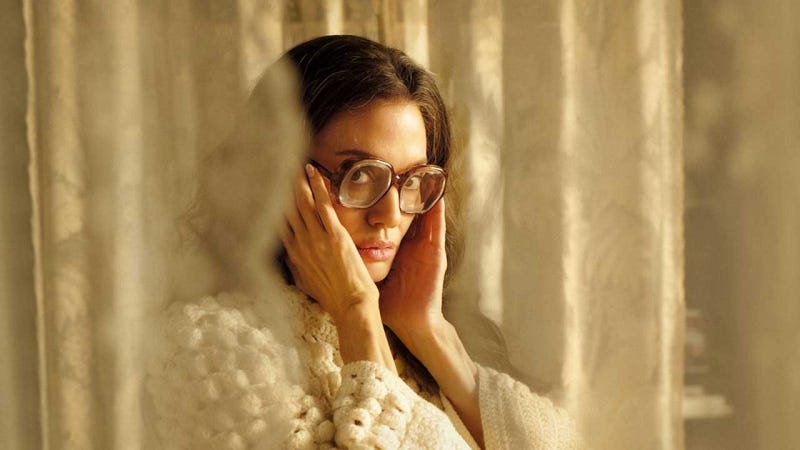Maria
Angelina Jolie is riveting in this dreamy, wistful take on the last days of opera diva Maria Callas that's less biography than rumination on what it's like to live as a legend.
Before you ask, the answer is no — Angelina does not do her own singing in “Maria,” a dreamy, wistful take on the last days of Greek opera diva Maria Callas. Or should I say, mostly not — there’s reportedly a bit of her own voice near the end, to reflect Callas’ waning power as she contemplates a comeback in her 50s.
Jolie trained for months to sing like an opera singer, though that’s something that takes years, decades to master. It’s not like Jamie Foxx, already a skilled vocalist, bending his tone and intonation to sound like Ray Charles, as impressive as that is. I get the sense Jolie undertook this not with the intention of substituting her voice for Callas’, but simply so she could embody her, particularly for the film’s many musical numbers.
“Maria” is from director Pablo Larraín, and represents the final leg in his trilogy about iconic 20th century women, with 2016’s “Jackie” and “Spencer” in 2021 both earning critical and awards acclaim. Steven Knight, who also collaborated on “Spencer,” penned the screenplay.
Unlike the other two films, “Maria” is less biography than a rumination on what it's like to live as a legend — the soaring privileges, and soul-stomping taxes. It’s set during the final week of her life, with flashbacks to her heyday on the stage and hiatus away from it enforced by paramour Aristotle Onassis (also a figure in “Jackie”).
“My mother made me sing, Onassis forbade me to sing, and now I am singing for myself,” she says of her secretly practicing with a pianist.
This version of “La Callas” is both queen and prisoner, a virtual recluse who hides away in her lavish Paris apartment for days at a time, attended only by her servants, butler/driver Ferruccio (Pierfrancesco Favino) and maid/cook Bruna (Alba Rohrwacher). They dote upon her, and scold her for her lack of eating and excessive use of pills — acting as both her children and parents.
Maria does go out occasionally, languidly walking around Paris in anonymity in her head scarfs and big, chunky glasses. (Callas was nearsighted to the point of blindness.) Sometimes she will perch at an outdoor cafe and invite recognition from the passerby because, as she says, “Today I crave adulation.”
There are oceans of egotism and vulnerability in Jolie’s performance. Her Maria orders people about and expects everyone she encounters to drop whatever they are doing and pay her attention. Simultaneously, the moment she is done with them, she expects them to disappear.
She’s tyrannical, and pitiable.
“I took liberties all my life, and the world took liberties with me,” she says, practically dictating her epitaph.
We see Maria burning most of her old opera costumes, and stashing pills in the pockets of her remaining wardrobe to throw her watchful servants off the scent. She orders Ferruccio to continually push the grand piano to this spot or that in her sprawling apartment, despite his bad back, based on her whim of where it will look most fetching that day, its keys untouched.
There’s also a story framing device of a journalist/filmmaker, Mandrax, following Maria about and interviewing her, with Kodi Smit-McPhee playing her interlocutor-slash-dashing flirt. This entire episode may be a figment of her imagination, and indeed in a lunch date with her estranged sister (Valeria Golino) she confesses that much of what we are seeing is hallucination.
Sometimes this is firmer autobiography, such as flashbacks to the Nazi occupation of Greece when a teenage Maria and her sister were essentially rented out by their mother to German and Italian soldiers. They pay to listen to them sing and, it’s implied, something more after their voices are stilled.
Other times Maria will wander into a whole banquet for the senses, such as an impromptu concert happening in the rain outside the Paris opera house. Or a flank of men marching on her in front of the Eiffel Tower, singing in boisterous union. These are soon to be revealed as figments of her drug- and starvation-induced imagination.
“Maria” is ultimately a star vehicle for Jolie, who does not disappoint with another riveting, Oscar-worthy performance. It’s amazing that the actress, who scaled back her filmmaking schedule a decade ago or so ago when she was arguably the most famous woman in the world, can still disappear utterly into a role like this.
I’m no opera fan. Like a lot of people more attuned to pop culture art forms like film, I find it very stiff and inauthentic. It’s ancient stories told a thousand times, and the style of singing often registers as shrieking to my tin ear. Yet I was repeatedly moved by the emotion so evident in Callas’ singing.
I could not understand the words, but the human torment and joy needed no translating.
Interestingly, I learned that Callas’ voice was much debated even during her heyday, with some supposedly in the know describing it as harsh and hard to listen to.
“Maria” is the story of a woman who, much like Jackie Kennedy and Princess Diana, achieved worldwide iconography but found it to be a cage from which they could not escape. Callas was born to sing, but few understood the pain it exacted to pull such a magnificent sound out of a body and soul.




"I could not understand the words, but the human torment and joy needed no translating."
You're channeling Red from The Shawshank Redemption today. :-)
"I have no idea to this day what those two Italian ladies were singing about . . . . I’d like to think they were singing about something so beautiful, it can’t be expressed in words, and makes your heart ache because of it."